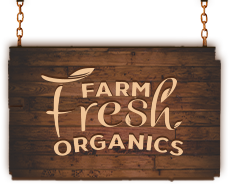Six Good Reasons to Eat Organic
Wednesday, November 16th, 2016 | crankit
Why should I go organic?
Going organic is like voting with your fork. Voting for the kind of agriculture you want to support and the kind of environment you want to leave future generations. In your lifetime you’ll consume over 100 tonnes of food and drink, representing not only a huge influence on your own health but also an enormous interaction with your environment. Your actions today create your world tomorrow.
It’s better for you
Organic food contains more nutrients and fewer pesticide residues. Studies have shown that on average, organic food contains higher levels of vitamin C and essential minerals such as calcium, magnesium, iron and chromium as well as cancer-preventing antioxidants. Heavy reliance on pesticides by conventional farmers is suspected of leading to increased rates of cancer and reproductive problems in humans.
It’s better for your children
Good food is important to all of us – but even more so for growing children. Children’s developing organs, brains, detoxification and immune systems, plus their larger intake of food per kilo of body weight combine to make them even more susceptible to toxins than adults. Toddlers eating mostly organic food have been found to have less than one sixth the pesticide residues in their urine compared to children eating conventional foods.
It’s better for farmers
As an ethical consumer I don’t want my purchasing decisions directly contributing to farmers harming themselves, their families, their staff and their neighbours. Yet farmers using pesticide sprays may be doing exactly that. Conventional farmers and farm workers have an increased risk of prostate cancer, more birth defects in their children, higher risk of their children having hyperactivity disorders, and higher risk of their children developing kidney, brain or other cancers. And it’s not just farmers, farm workers and their children at risk. Epidemiological evidence also shows greater incidences of birth defects in the children living near farms using pesticides.
It’s better for animals
While many farm animals lead short, stressful or sick lives before you see their meat, milk or eggs, the health and well being of organic animals is central to organic principles. The welfare of animals is not only important for their wellbeing but also to produce quality food. Organic farm animals are well looked after because organic farmers believe keeping animals healthy through good nutrition and careful management is better than relying on drugs to treat illnesses.
It’s better for the environment
Organic farming bans artificial fertilisers that can pollute rivers and contribute to toxic algal blooms in coastal waters. Organic farmers fertilise their fields more naturally by rotating their crops, using composted manure, and planting crops that enhance the fertility of the soil. Instead of using pesticides that can harm fish, birds and other wildlife, they control pests and weeds with non-chemical methods like mechanical weeding or companion planting. Genetically modified (GM) crops, whose environmental impacts are still unknown, are not allowed in organic farming.
But best of all, it tastes better
How many times have you thought or heard the comment that food today is tasteless? Modern varieties are chosen for yield not taste, grown out of season, picked green, transported long distances, stored in controlled atmosphere for long periods, and sold as ‘fresh’ in the supermarket. It’s no wonder they don’t taste how they should. Compare this with the consistent consumer experience that organic food really does taste better. Tastes how food should. Tastes how food used to. If you’ve not tried organic food, bite into an organic carrot or apple today and you’ll see what they mean!
For all these reasons and more, going organic is a smart and conscious choice. Is it worth the extra cost? You bet. Organic food isn’t a luxury. It’s how food is supposed to be. Organic farming offers a real alternative and buying organic food supports a positive approach to healthy food and farming.
